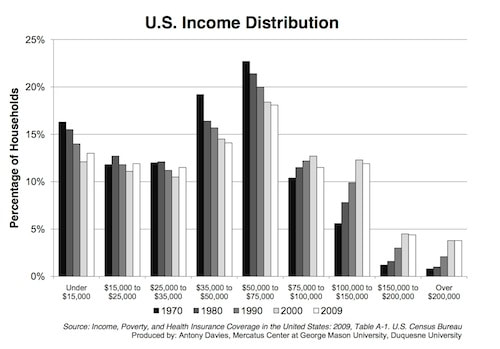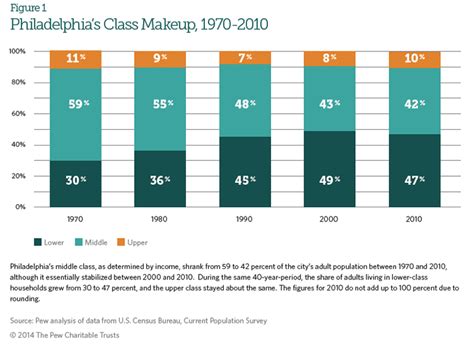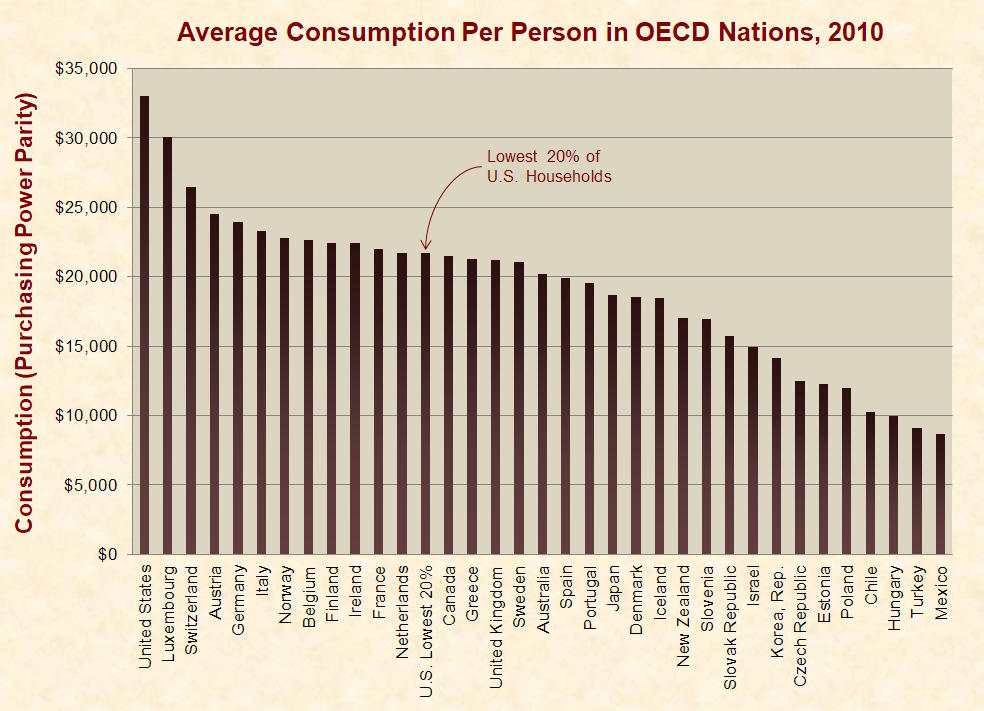|
I’ve had some conversations with people that were going against the grain saying, “things have never been better! People complaining just don’t know anything!” I come across this type of thinking once in a while and it’s just weird to me how they ignore the reality a lot of people face today with their quality of life and finances. The people saying the opposite, that’s things are better than ever for everyone, do at least try to back up claims with some economic studies and graphs though, so it’s good conversation. This was one online conversation I had with someone. They started out by stating: In the US, there's an increasing number of people from both sides that try to claim the average American's standard of living has gone down and blame it on the other side. This is simply not the case, as all economic and production figures show. So, I engaged this and said, “The average standard of living HAS gone down. It's getting harder and harder for people starting out to live a comfortable, middle-class life. Housing and education are getting too expensive too fast. Wages aren't keeping up to compensate.” I laid out my evidence for comparison to consider: Median Price of a home in 1980: $47,200 vs 2020: $391,900. Median Family income 1980: $21,020 2020: $71,456 Home price as percentage of income 1980: 225% 2020: 548% Median tuition cost of Boise State University resident 1980: $239 2020: $4,030 Tuition price as percentage of income 1980: 1.14% 2020: 5.64% “GDP is increasing, good, but the rewards aren't being enjoyed by majority of the population. GDP doesn’t mean that it’s money in everyone’s bank. It’s too concentrated in the hands of a few. Corporations enjoying record profits are also enjoying large amounts of stock buybacks - not wage or bonus increases. A strong GDP doesn't matter as much when the rewards are too concentrated in benefitting those that are already well off. I came of age to graduate university, get a decent job, and buy a house about 6 years after my brother. My brother's college tuition was about a thousand less per semester AT THE SAME SCHOOL! He got a nice, 5-bedroom house with below ground pool and hot tub for $350,000. 6 years later, that same house is worth $650,000. I had to pay $400,000 for a starter home in the same town. 3 bed/2 bath, 1,400 sq. ft., no pool or anything nice. Job wages are pretty much the same, maybe a dollar higher. I'm stuck paying more for less for the next 30 years. More for the same education and more for a lesser house. I will forever have less disposal income than people that "came of age" at a better time and less savings or opportunities because of this unless something happens, like one could argue, I could've gone to a different university or move away instead to a cheaper place. Maybe true, but this increasing cost of living is happening just about everywhere, and it's pathetic that in a country with supposedly booming stats you listed that people should have to keep moving out to the frontiers instead of life getting better for future generations as has been the case for the previous 200 years.” Here's the first response I got: I'd argue that house prices are just asset prices and therefore not a good measure of quality of life. If you, the buyer, suffers in terms of quality of life, then the seller benefits just as much. Increases in tuition prices are due to higher wages for professors and more resources devoted to research rather than just teaching, which means your higher tuition goes into increasing the knowledge of humanity as a whole. Me: “’If you, the buyer, suffers in terms of quality of life, then the seller benefits just as much.’ Obviously, I hope my ‘asset’ appreciates for me to sell and make a good buck from it too, but this still neglects the facts I laid out about the cost of living getting too out of hand for up-and-coming generations. This just reinforces the idea that everyone that got theirs sooner continue to get boosted wealth at the expense of future generations’ detriment, so again, it’s GREAT for the rich or at least those already on the path to building wealth, but for anyone starting out it’s getting more difficult. Unless you're in the very few high paying careers, it's getting tougher to have the comforts or even necessities of disposal income previous people and generations enjoyed. Everything you mentioned shows that the economy is good for everyone that already got theirs, and it's getting better for them, I think, but for everyone else starting out, I still don't see how you show they have it better than ever. There's no way! Wages are up some overall, sure, but some of the crucial expenses (stats I listed) have gone up at far higher rates, thus diminishing the wage increases. I mean, I'm still open to be proven wrong. Maybe I'm missing it. How can these stats be interpreted to say we have it better than ever, when my grandfather could pay for a college degree with a part time ‘high school kid summer job’ then work a common office or factory job and afford a nice house with an acre of land, rental properties, new cars, and lavish vacations, all on just his income, living in a big city, and acquiring these within 10 years of graduating? The same job now pays $50k-$80k. Hard to make all that happen today. It's anecdotal, yes, but there are thousands of examples like this everywhere.” Second response to me: I agree if you focus too much on housing and tuition (which seems to be your biggest focus), it may seem like a drop in standard of living; but I'm willing to suggest you grandfather's cars, which were considered ‘high end’ back then, was as good as a low-end car today. And for the vacation, weren't plane tickets much more expensive back then? And if you mean a road trip by vacation, he'd have to drive with a low-end car (by today's standards) on a worse highway than you have now. And this is not considering he didn't have access to an incredible library of knowledge like the device you're using. These are just a few examples, and there are other examples of things we have much better now thanks to technology. The conversation wound down and basically ended there, but I regret not going hard again on the emphasis of their last sentence. I should be grateful for my contributions… OK, the whole POINT of the conversation, was about why people are pessimistic about how the future is looking bleak. Instead of answering to how it’s better, we should be grateful or proud of our contribution to lining the pockets of universities, to student loan interest, and to the banks and previous owners of houses, at our expense and the expense of our ability to save and thrive. Why do I “focus too much on housing and tuition?” Because those are typically the two best steps to building wealth – an education for a better paying career and building homeowner equity wealth. If people are spending too much of their income on housing and student loan payments, there isn’t enough left to save and invest or contribute more actively in the economy. They also pivoted to the advancements in technology instead of addressing the issues. I see this happen often when cost of living challenges are discussed. I am grateful for the advancements in things like technology and medicine. I just wish I could enjoy them more if I could afford it. I think of the analogy of having to run on a treadmill for a prize. It’s slower and basic for the first contestants. New people joining the challenge get newer treadmills that come with a fan and virtual reality environment, but it moves at a much faster pace. The new contestants get to enjoy more luxury but have to work harder for the same prize. The prize of financial stability and comfortable disposable income. I might agree with this person that things are generally pretty good and improving for those that secured their middle class or higher position (good career underway, home ownership, low student loans or none), but for everyone else coming of age trying to afford the education costs, first time home buying, and other things, it feels like a real struggle and missed opportunities compared to what our peers enjoy even though they followed the exact same path, just doing it sooner when it was all more affordable. Another Conversation: There’s some kind of data studies that resulted in the info found in these graphs. They're used as evidence to argue everyone is better off and here’s the proof. Ignore the reality of the struggles you’re facing. This chart proves you’re better off! Here’s another conversation I had with someone using this chart, but it felt like a failed conversation because this person just spouted off a whole bunch of weird stats and wouldn’t address anything I said. Maybe I was speaking to a bot: The Middle Class is disappearing because they are moving into the upper class. This is demonstrably true. The poor are also getting better over time. Then when you add in government transfers the picture is even better. 1/3 of US households now have an annual income over $100,000. I can give you the data. The error that is usually made is that people look at the middle class shrinking (It is. The data says that) but assume they are becoming poor. That’s just not true! The data doesn’t support that. That’s a political narrative. The poor have been reduced by about 10% since 1967, the middle class reduced over 11%, and the rich increased by about 20%." My first comment: “It's weird hearing (reading) people go against the grain stating stuff like this like how things are better than ever and we're all crazy for thinking times are getting tougher. I've seen this guy's presentation and exchanged an email chain of conversation with him. I'm impressed with his willingness and availability to communicate openly. One thing he failed to deliver on, though, is reconcile these stats with how the cost of living is without a doubt different/worse now than it was 40-70 years ago. This may be proof that there are more people earning higher incomes, which is good, but people in the lower two brackets are getting crushed harder than they were before. For example, university costs (in America at least) and housing costs are two of the biggest lifelong investments to building wealth. The cost of these are way higher for percentage of average income than ever. For people that got theirs sooner, great, you're doing well. For people starting out trying to pay for college and buy their first home at these astronomical prices, they're suffering, and it only seems to be getting worse for the middle- and low-income groups, even if they are, technically, becoming a smaller group overall.” Their first response to me: With Covid and the general incompetence of the Federal Reserve and Government. What we are experiencing now is not typical. It is exceptional. To take something exceptional and hold it up as typical would be intellectually dishonest. People often look at a snapshot in time. That can often be misleading. I am looking at it over time. Would you have said what you are saying now in 2018? Maybe not. I spend thousands of hours studying this kind of thing. I give lectures on it. An epistemological razor is something philosophical that whittles away something or makes it smaller. An example of this would be Hitchens’ razor. Hitchens’ razor states that which is asserted without evidence, can be dismissed without evidence. So, the goal post has been moved. I had no idea what they were going on about COVID for or looking at why I wouldn’t be saying this stuff in 2018. They lost me and never cleared it up when I asked, but I did respond to the statements about us doing better than Europe and OECD countries. I said, “This is great! Aren't we so lucky? It sounds like you're making the case that everything is better than ever, right? And people are only manipulated to thinking the opposite, that we're getting poorer. I can understand that overall income + transfers and whatnot may show as everyone doing better and making more money than ever before, but I still don't understand how it reconciles with the cost of living for goods, especially housing and university costs, outpacing that income growth. If incomes are up, but costs up even more, than it's getting worse for the lower incomes! Is this not actually the case? There's hundreds of examples out there of buying power going WAAAY farther 50 years ago or so. There's whole threads about it like this one.” Again, they’re not addressing the difference in increasing cost of living and how it’s getting harder. They’re deflecting again now by comparing us to other nations. I've heard this argument a few times too. Comparing to similar economic countries is better, but I still don’t really like it. It doesn’t address the concern of things getting harder, and apparently even harder for other countries’ poor too. It's an irrelevant argument. Sure, we can and should still be grateful for what we have in a developed nation, but that still doesn't mean everyone's quality of life is abounding in prosperity. When we compare the standard of living of poor people in America to the rest of the American population and know the capabilities and resources the country has to offer, I know we can do better. Comparing the standard of living of poor Americans in the 21st century to people from very poor countries in other parts of the world or even comparing to the poor living conditions of past human history is a false equivalence, red herring fallacy to divert attention and focus on a separate issue that only has a minute relation to the main issue. Apples and pears are both pome fruit, but they are not the same. A poor person in America is not a fair comparison to a poor person in Burundi. Poor Americans will obviously still have a better standard of living than a poor person in Burundi simply because of the different laws, government, social safety net, regulations, national resources, and proximity to services and technology when comparing the two nations. They are both poor people, but it's not an equivalent comparison. Final Comment I took from someone else when there was an argument about conflicting minimum wage studies. Some showed the benefits of raising them, others showed the negative effects:
Welcome to economics, where it’s a soft science yet passed off as a hard science. We don’t really know what raising minimum wage will do or not since it’s humans making decisions at the end of the day. And humans can’t be quantified no matter how hard as a society we believe it’s possible. You can look at places like Texas with a low minimum wage and see the decent living standards, but across the pond in Europe you can see how a high minimum wage also has decent living conditions. At the end of the day lots of economic theories today are used as justification rather than understanding. Much to the detriment of society as a whole. If we wanted to be truthful we would understand that there isn’t one way or one right answer to approach economics, but who does that benefit? Not the people who fund these institutions and studies. It is nearly impossible to control for other economic factors, so the results of these studies are... questionable.
0 Comments
Leave a Reply. |
The main focus of our discussion is about what struggles people face trying to get into or maintain a middle-class life and prepare for a better future. What would help? We discuss jobs, economy, politics, inequality, other life observations, and most importantly, helping people. Get to know us better and join the conversation.
Archives
February 2024
|



 RSS Feed
RSS Feed